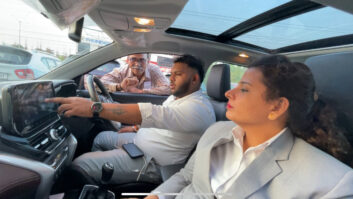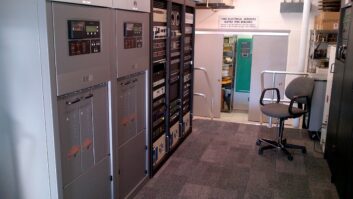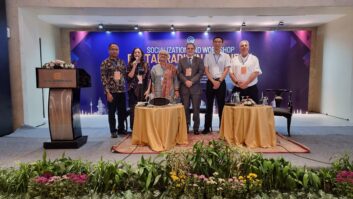WASHINGTON — Protection of NCE FMs against potential interference from low-power television stations on Channel 6 in the future is being debated. Meanwhile, the last vestige of ambiguity in the FCC rules regarding so-called “Franken FMs” is closer to being stamped out.
The commission is reviewing public comments about rules governing the transition of low-power television to digital. The Media Bureau proposed such rules in July.
Petitions for reconsideration involving radio were filed in the fall by NPR and engineering consulting firm Hammett & Edison. The organizations agreed that NCE FMs need to be protected from potential interference from digital low-power Channel 6 TV stations, but they disagreed on whether noncoms are afforded any such protection in the proposed rules, and whether the FCC needs to spell out specifically how and in what circumstances NCE FMs need interference protection.

Photo by Bob Kovacs
NPR believes the FCC proposals appear to limit LPTVs and TV translators to protecting only first-adjacent NCE FMs from potential interference. It wants the agency to spell out protection for all “adjacent” NCE FMs in the new LPTV rules.
NPR stated there’s no technical reason why LPTV television Channel 6 stations operating with substantially increased power would cause interference to first adjacent NCE FM stations but not second-, third-, or other adjacent NCE FM stations. Indeed, NPR says its testing demonstrated a substantial likelihood of interference throughout the reserved portion of the FM band.
Hammett & Edison concurred that NCE FMs are protected from interference from LPTVs on Channel 6 in theory, but argued that the language is not meaningful without a Part 74 rule regarding the impact on radio from LPTV, TV translator and TV boosters.
“Section 74.703(b) of the commission’s rules discusses the obligation of a secondary LPTV/TV translator/TV booster station not to cause interference to the reception of existing TV signals, but makes no mention of interference to the reception of FM signals,” Hammett & Edison states.
It asked rhetorically how a digital LPTV licensee can know there may be a problem if it obtains a CP and builds a facility, in the absence of benchmarks.
In its petition for reconsideration, NPR asked the FCC to clarify that LPTVs must protect noncom FMs from interference from adjacent LPTV Channel 6 stations and include that obligation in its rules governing the LPTV service.
The network also asked the commission to specify that LPTVs using TV Channel 6 to provide an FM radio service “in lieu of a bona fide television service” are operating without commission authority. That’s a reference to so-called “Franken FMs” — Franken as in Frankenstein — that operate analog aural carriers on 87.7 MHz.
As RW has reported, NPR believes those LPTVs are causing interference to member stations; the LPTVs say they’re operating within the law. NPR wants the commission to clarify the situation, especially if it authorizes Channel 6 LPTVs to operate with increased power.
The FCC, meanwhile, has not stepped in to illuminate the “Franken” situation, which will end regardless when LPTVs go digital.
Technical standards
H&E calls for technical standards for “D06-into-NCEFM stations.” The firm suggested that if the commission wants to go this route it should open a rulemaking on the issue specifically.
“We do not want to see a nonexistent protection requirement for DTV-into-NCEFM arbitrarily and capriciously established,” stated H&E, adding that it’s past time for the FCC to finish updating its rules to reflect the reality of current digital TV operations.
The reply comment period for those petitions ended in mid-December, and NPR and H&E submitted comments about each other’s filings.
NPR said the commission doesn’t need to reconsider its LPTV Report & Order based on the H&E petition.
“To address concerns raised by NPR about potential interference to NCE FM stations, the commission affirmed the secondary status of LPTV stations and their obligation to protect primary services, including NCE FM radio stations, from interference,” it wrote.
“While the Hammett & Edison petition agrees that such protection is required, it seeks reconsideration of the Second Report and Order based on a lack of technical criteria for predicting when such interference might occur.” NPR urged the agency to reject the H&E petition. The network is not opposed to the development of further technical standards to predict the occurrence of LPTV-to-NCE FM interference, but believes that’s a matter “separate from an obligation to ameliorate interference that an LPTV station actually causes.” Hammett & Edison agrees that the FCC erred by restricting interference protection rights of a noncommercial FM from a TV Channel 6 LPTV or TV translator only to first-adjacent channel NCE FMs.
“A secondary TV Channel 6 LPTV or TV translator station, especially one operating at the now allowed 3 kW effective radiated power, could cause interference to an NCE FM station operating on any of the reserved channels, not just FM Channel 201 (88.1 MHz),” it wrote in comments in December.
“NCEFM stations on FM Channel 202 (88.3 MHz) or FM Channel 203 (88.5 MHz) would presumably be less susceptible to adjacent-channel interference from a digital TV Channel 6 station, but not immune to adjacent-channel interference.
“For FM Channels 204 through 220 (88.7–91.9 MHz), brute force overload interference could be created to NCE FM listeners close to a TV Channel 6 transmitter.”
H&E believes the commission needs to develop technical criteria defining both digital TV Channel 6-into-NCEFM interference, and NCE FM-into-digital TV Channel 6 interference. Such technical rules would also provide the commission with a benchmark to use in determining whether a particular application should be granted, H&E believes.
Timing
As far as timing for the transition, the FCC in July proposed a Sept. 15, 2015 deadline for low-power television stations to transition to digital. Among other things, the FCC proposed requiring existing analog and digital LPTVs in the 700 MHz band (Channels 52–69) to cease operations in the 700 MHz band by Dec. 31, 2011.
The National Translator Association said in public comments the Dec. 31 construction deadline is unworkable and asked that it be extended to June 30, 2013. Other commenters requested delaying the deadlines as well. NPR opposes efforts to delay the LPTV transition.






